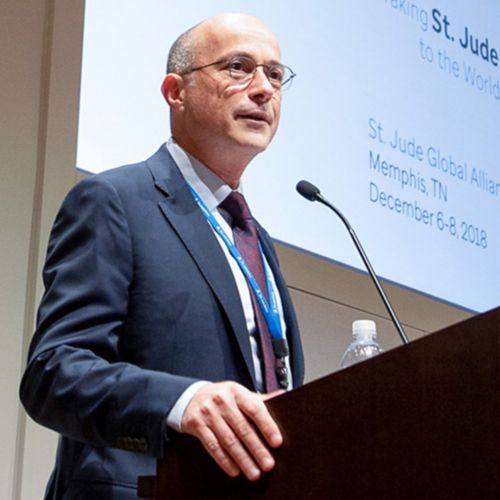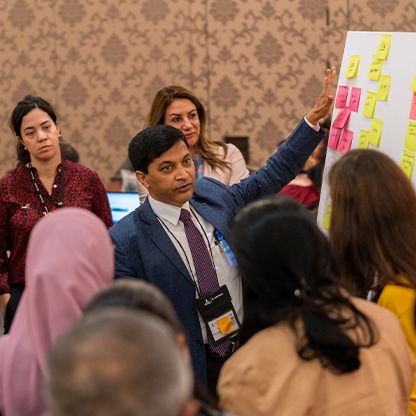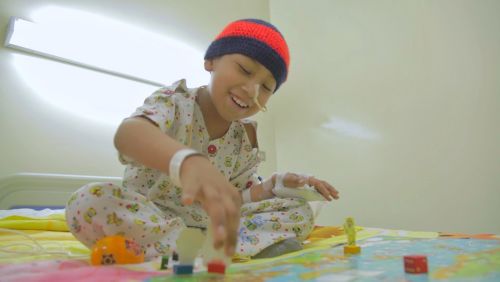Where a child lives is the most powerful predictor of whether they will survive cancer.
St. Jude Family of Websites
Explore our cutting edge research, world-class patient care, career opportunities and more.
St. Jude Children's Research Hospital Home

- Fundraising
St. Jude Family of Websites
Explore our cutting edge research, world-class patient care, career opportunities and more.
St. Jude Children's Research Hospital Home

- Fundraising
Transforming Childhood Cancer Care: A blueprint for systemic change
Fifty years ago, childhood cancer survival rates in high-income countries (HICs) were around 30%. Modern therapies and supportive care have driven that number above 80% today. Low- and middle-income countries (LMICs), home to nearly four in five of the roughly 400,000 children that develop cancer each year, do not have the same resources. In many countries, children with cancer still face a less than 30% chance of survival.
A direct outgrowth of the Global Initiative for Childhood Cancer (GICC), the Global Platform for Access to Childhood Cancer Medicines (Global Platform) is a groundbreaking initiative aimed at addressing this disparity by ensuring that lifesaving cancer medicines reach the children who need them most. By addressing issues of the availability, accessibility, affordability and quality of medicines, the Global Platform is reshaping how the global health community tackles one of the most urgent challenges in pediatric oncology. A $200 million investment from St. Jude Children’s Research Hospital (St. Jude) highlights an unprecedented commitment of resources, expertise and collaboration. “We are now able to tackle the rare pediatric cancers and make progress against those because we’re working as a global community,” explains St. Jude President and CEO James R. Downing, MD.
Collaborating to overcome challenges
St. Jude has partnered with World Health Organization (WHO) in collaboration with United Nations Children’s Fund (UNICEF) and Pan American Health Organization (PAHO) Strategic Fund, to co-design a systemic approach with governments, the pharmaceutical industry, and non-governmental organizations (NGOs). Together, these stakeholders are restructuring the fragmented cancer medicine market, creating a model that can serve as a blueprint for addressing broader global health challenges with a goal of treating 120,000 children in the next five to seven years and helping to achieve the GICC goal of 60% overall childhood cancer survival globally by 2030. In February 2025, medicines delivered through the Global Platform began arriving in the first pilot countries and now, with the lessons learned from this initial cohort, a second wave of six countries has now begun onboarding.
Navigating barriers to medicines access
Each country faces unique challenges, requiring tailored solutions. Globally, the availability of essential childhood cancer medicines is inconsistent due to supply and demand issues and complex regulations. Financial barriers compound the problem, as the cost of childhood cancer medicines is often excluded from budgets, leaving families to face significant financial hardship. Additionally, the quality of medicines is threatened by sub-standard and falsified products.
The Global Platform addresses these systemic barriers through innovation, collaboration and continuous improvement. Global, regional and county cross-functional teams work across six key themes—governance, forecasting and quantification, clinical aspects, monitoring and reporting, supply management, and regulatory pathways—to build technical foundations that enable countries to strengthen their systems. Participating countries begin with system readiness to receive and administer the Global Platform medicines, transition to active receipt and ultimately aim for sustained supply. Quarterly reporting ensures that evolving needs are met, while insights from pilot countries inform improvements in governance, policies, processes and tools.
“Access to quality medications is critical for the success of any programs at the country or global level. Children cannot survive – cannot have hope without proper access to essential medicines. This has been something that we have identified as a priority.”
Carlos Rodriguez-Galindo, MD, St. Jude Children’s Research Hospital President EVP & Director, St. Jude Global

Building a tailored approach to strengthening health systems
The impact of the Global Platform is already visible in the first six pilot countries: Ecuador, Jordan, Mongolia, Nepal, Uzbekistan and Zambia. These countries are co-designing implementation strategies for their specific needs. The Global Platform provides technical assistance through engagement with experts, targeted training modules and development of readiness assessments to empower countries. For example, Nepal has instituted a national guarantee of free cancer treatment for all children up to the age of 14 since receiving its first shipment, Ecuador has demonstrated how collaboration can turn challenges into opportunities for health system improvement and Zambia’s early engagement with partners has helped clarify expectations and streamline processes.
By increasing political commitment, enhancing supply chain capabilities and strengthening health systems, the Global Platform is not only saving lives but also creating a sustainable, scalable foundation for childhood cancer care. The initiative continues to scale up in 2025, with six additional pilot countries, El Salvador, Ghana, Moldova, Pakistan, Senegal and Sri Lanka joining the Global Platform, further boosting the global capacity to treat childhood cancer and increase survival of children with cancer to 60% by 2030.
Creating a sustainable model for global pediatric oncology
The Global Platform is transforming pediatric oncology in LMICs. Leveraging unmatched resources, expertise and partnerships, St. Jude is addressing systemic barriers to childhood cancer medicine access while empowering countries to build sustainable systems. This initiative sets a precedent for how the global health community can co-develop solutions to complex challenges. For the children and families facing the devastating reality of cancer, the Global Platform represents hope and a commitment to ensuring that no child is left behind.
A Global Movement to Improve Survival and Reduce Suffering for Children with Cancer and Other Catastrophic Diseases
St. Jude, WHO, Uzbekistan and the Zamin Foundation are co-hosting a side event on this topic at the United Nations General Assembly on Sept. 24. Register to save the live-streamed event to your calendar.


